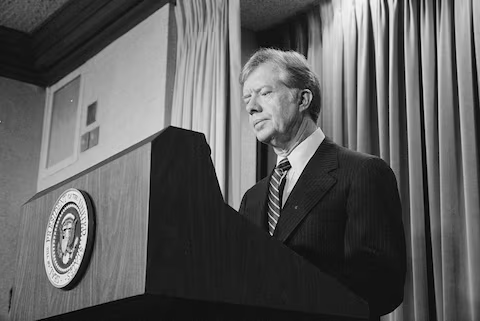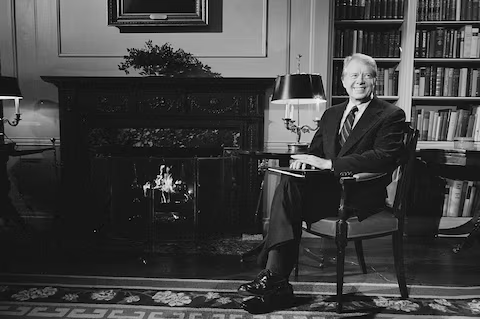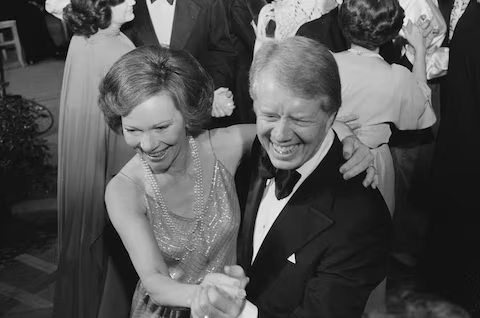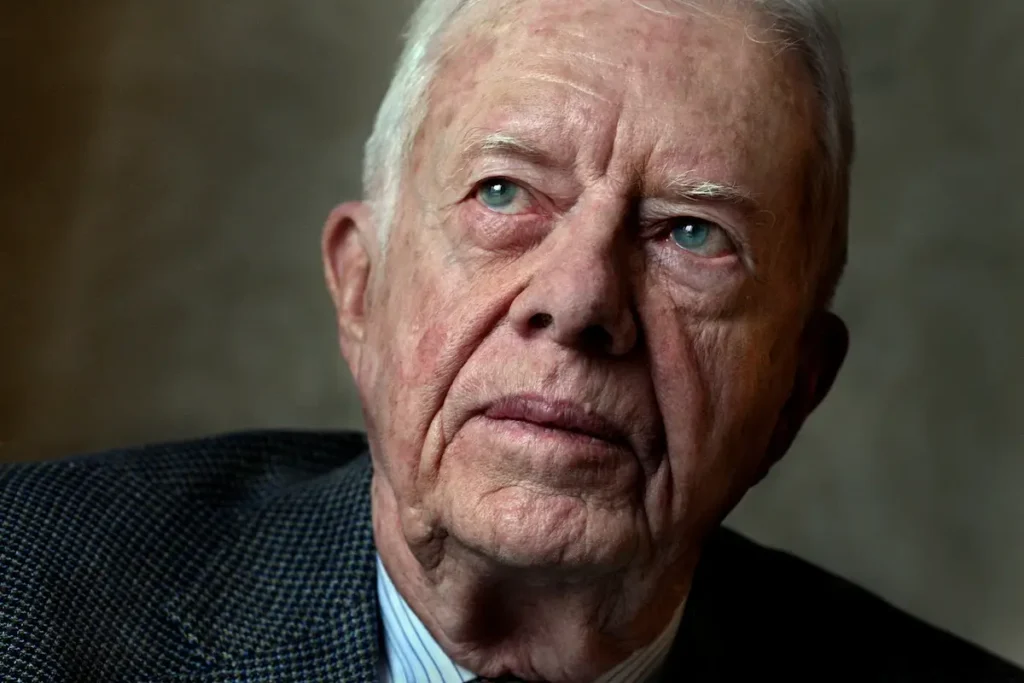After a life devoted to service, peace, and human rights, Jimmy Carter, the 39th president of the United States and recipient of the Nobel Peace Prize, died on Sunday at his Plains, Georgia, home. He was one hundred years old. President Biden has designated January 9th as a national day of mourning to honor the life of this extraordinary leader.
Jimmy Carter’s Presidential Legacy (1977-1981)
As the 39th president of the United States, Carter’s tenure was shaped by both remarkable diplomatic achievements and significant challenges.
Key achievements during his presidency:
- Camp David Accords: Carter brokered the historic peace agreement between Egypt and Israel in 1978, a feat that earned him the Nobel Peace Prize in 2002.
- Creation of Departments of Education and Energy: Carter’s administration established these key departments, reflecting his commitment to improving American education and energy policy.
- Diplomatic Relations with China: Carter played a pivotal role in establishing formal diplomatic relations between the U.S. and China in 1979, reshaping global politics.
- Panama Canal Treaty: He negotiated the treaty that returned control of the Panama Canal to Panama, a move that helped improve U.S.-Latin American relations.


However, his presidency was also marked by numerous challenges, including:
- Economic Recession and Inflation: Carter faced severe economic issues, including double-digit inflation and rising unemployment.
- Iran Hostage Crisis: One of the darkest moments of his presidency, 52 American hostages were held in Iran for 444 days, severely damaging his public image.
- Energy Crisis: Gas shortages and rising energy costs presented a significant challenge during his presidency.
- Soviet Invasion of Afghanistan: Carter’s response to the Soviet invasion in 1979 included a boycott of the Moscow Olympics and economic sanctions.
Jimmy Carter’s Post-Presidency Humanitarian Work
After leaving office in 1981, Carter redefined the role of former presidents with his extensive humanitarian work. He was particularly focused on global peace, human rights, and disease prevention.
Notable achievements after his presidency include:
- The Carter Center: Carter founded the nonprofit organization in 1982 with a mission to advance human rights, improve global health, and promote democracy.
- Nobel Peace Prize (2002): Carter’s tireless efforts in international conflict resolution and peace-building earned him the Nobel Peace Prize, recognizing his contributions to peace and democracy.
- Election Monitoring: Through The Carter Center, Carter led numerous election monitoring missions, ensuring the integrity of democratic elections around the world.
- Disease Prevention: He worked on initiatives to prevent diseases like Guinea worm disease and malaria in developing countries.
Jimmy Carter’s Personal Life
Born on October 1, 1924, in Plains, Georgia, Jimmy Carter was a deeply devoted family man and community leader. He graduated from the U.S. Naval Academy and served as a nuclear submarine officer in the U.S. Navy.
- Family and Early Life: He married Rosalynn Smith in 1946, and together they had four children. Rosalynn, his life partner of over 70 years, passed away in November 2023.
- Georgia Governor: Before becoming president, Carter served as governor of Georgia from 1971 to 1975, where he worked to improve the state’s education system and advocated for civil rights.
- Sunday School Teacher: Throughout his life, Carter remained a devoted Sunday school teacher, preaching at his local church even after leaving the White House.

Jimmy Carter’s Historical Impact
Following his administration, Carter’s legacy gained prominence. Even though international crises and economic unrest frequently overshadowed his tenure in office, his post-presidential activity revolutionised the way past presidents interact with the people. His support of democracy, human rights, and peace established a new benchmark for post-presidential involvement.
World leaders have often praised his compassion, dedication, and moral clarity. The Nobel Committee noted that his work
“will be remembered for another 100 years or more.”
Jimmy Carter’s Final Years
In February 2023, Carter entered hospice care, a decision he made after celebrating his 98th birthday. He made his final public appearance at the memorial service for his beloved wife, Rosalynn, in November 2023.
Leaders from all across the world have paid tribute to Carter since his passing, reflecting on his extraordinary life and impact. Following public commemorations in Atlanta and Washington, D.C., to honor his service, Carter will be buried privately in Plains, Georgia, where he spent his last days.






